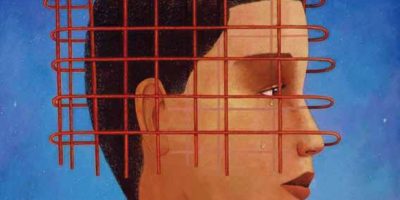“A world that did not include her enslavement.” Noteworthy Poetry
Rebecca Wolff, a Jewish-American poet and editor of Fence Magazine, is at the top of her game in her third book of poems, The King (W.W. Norton, $24.95), an engrossing glimpse into the mind of a new mother faced with postpartum depression. Wolff ’s poems are spare, often packed into short, jagged lines in which she authentically evokes the emotions of a mother alienated from her child and herself. In the aptly titled poem, “I live in the rectory,” Wolff writes of her distant feelings toward her child: “I can’t tell the difference / between myself (momentarily) / and that one over there.” This loss of identity permeates the book. Many of Wolff ’s lines startle with their darkness; others are laced with humor. In “The Letdown,” her powerful poem about weaning her baby, Wolff writes: “I wiped that smile / right off your face / and by withholding / the milk from my breast / made a man out of you.” Although Wolff doesn’t gloss over these harrowing experiences, the book is rife with sensual imagery and maternal love. In another section of “The Letdown” Wolff imagines nursing her child again. Her language softens to a calm lyricism: “I dreamed I nursed my baby / at my breast. In a rocker / on a steamship / by a porthole / the horizon.” Ultimately, the book is not just about her alienation and depression as a new mother, but also her redemption from these feelings: through these poems, Wolff gives voice to an experience that is all too common, and too often hidden behind closed doors.
Suzanne Gardinier is a poet like no other — visionary, feminist, historian, mystic. Her poems defy labels, and are entirely her own, though many are told in voices not her own. In her latest collection, Dialogue with the Archipelago (The Sheep Meadow Press, $15.95), we hear from Eve, Demeter, Penelope, Helen, Persephone, among other heroines, with Gardinier’s voice coming through in poems about the dissolution of a romantic relationship. The poems are often lessons in history, with references to the Vietnam War, the invasion of Panama, and World War II; and allusions as diverse as The Book of Ruth, New York Review of Books, and the U.S.M.C. Unit Leaders Personal Response Handbook. One of the threads of the book is the enslavement of women throughout history, with several poems depicting women breaking free from their chains. In “Dialogue 55/To be continued,” Gardinier writes, “Once upon a time there was or there was not / a woman who stirred and opened her eyes / On a world that did not include her enslavement.” Some of the highlights of the book are Gardinier’s lush love poems. Here is where the book — with its density of information, its leaps in time and space — becomes breathtaking.
from “Dialogue 35/Layla’s Song”:
If you know that I haven’t forgotten the language / we made from the weapons and litter they gave us
If you know that the choked distance between us / is most easily measured in years
Then explain why the crook of my elbow without you / smells of you Why the desert plants’ thirst
At the end of each long afternoon is your mouth / against my mouth and I drink
It is with warm anticipation that I greet a new book by Kim Addonizio. Her poems are always accessible, sexy, sarcastic, and, at their core, deeply emotional and moving. Her fifth collection, Lucifer at the Starlite (W.W. Norton, $23.95), is as dark and sardonic as the title suggests. Most of the poems extend beyond the personal subjects that are her usual theme to comment on current events and issues that define our times. The opening poem, “November 11th,” set on Veteran’s Day 2004, days after George Bush was reelected president, begins: “O everyone’s dead and the rain today is marvelous!” These lines set the tone for the book, whose focus on the bleakness and malice of the world comes from within the poet herself as well as from the world outside. The last section of the book showcases Addonizio’s more confessional side, steeped in depression and looking for a way out. Here, Addonizio begins to resolve her rage, and something like hope begins to form. In the poem “News,” Addonizio looks out her window and sees her neighbor, “an old black man who lives alone.” She tries to connect to him, taking out her harmonica and playing a tune. Addonizio comments: “I don’t know if he listened, if it lit / a match to the damp cigarette of his joy / I can’t say, but maybe it did / in some small and unrecorded way.”
Wendy Wisner is the author of the book of poems Epicenter. Her poetry has appeared in The Spoon River Review, Rhino, and elsewhere.


